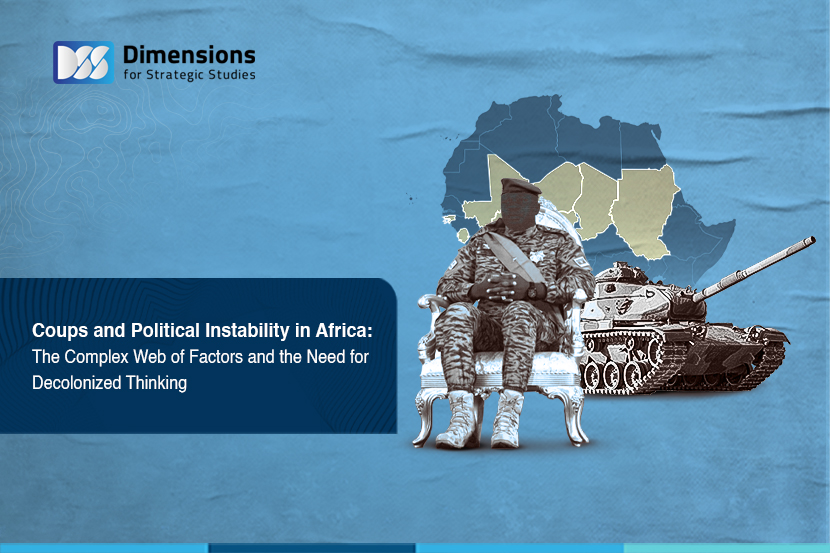
Coups and Political Instability in Africa: The Complex Web of Factors and the Need for Decolonized Thinking
2023-09-062608 view
The author endeavours to provide an overview on the underlying forces propelling the occurrence of coups in Africa. This includes an exploration of their colonial origins, as well as the intricate interplay of local dynamics. Furthermore, the author underscores the imperative for a strategic, long-term approach aimed at empowering the inhabitants of African nations to construct a unique and self-representative model, free from the shadows of colonial influence.
Africa has been a theater of political upheavals for decades, particularly between the years 1960 and 2000, witnessing a staggering 82 coups during that period. These coup attempts were driven by a complex interplay of local and external factors, deeply rooted in the historical legacy of colonization.
However, the continent experienced a period of relative stability from 2007 to 2018, with no recorded coups, as democratic transitions began to emerge.
Coups again
In recent years, Africa has faced a resurgence of political instability, marked by 13 coups or coup attempts after 2020. This resurgence can be attributed to a range of factors , including political failures, economic crises, the COVID-19 pandemic, and the growing influence of transnational extremist groups like ISIS. Additionally, external interventions have exacerbated the situation, complicating the political landscape.
The Domino Effect, to what extent?
One striking phenomenon is the "domino effect," where the prevalence and success of coups in certain countries, such as those that experienced the Arab Spring, (Egypt, Tunisia, and Sudan), have emboldened coup movements in other nations. This is particularly concerning because the regional and international community often hesitates to impose meaningful sanctions on coup leaders, frequently refraining from openly questioning their legitimacy. This reluctance inadvertently emboldens coup leaders to retain power.
Calls for Pragmatic Engagement
Recently, some Western intellectuals and political pundits have advocated for a pragmatic approach by the United States in engaging with military councils that responsible for recent coups in Mali, Burkina Faso, and Niger (the Sahel region). They argue that this approach is necessary to prevent Russian influence from gaining a foothold in these countries and to coordinate counterterrorism efforts with these councils to counter the rise of Islamist extremist groups.
The Pitfall of Short-Term Thinking
However, a major regarding these calls is their apparent lack of deep and long-term consideration for the interests of African nations and their people. This suggests that a colonial mindset still lingers among some Western thinkers and writers. Africa has long been exploited by the West, with its vast resources plundered for the benefit of external industries. This exploitation has left the continent in a state of perpetual poverty, underdevelopment, and political weakness, creating fertile ground for the growth of extremist groups.
The Need for Decolonized Thinking
To comprehensively address Africa's challenges, it is imperative to embrace decolonized thinking. This means recognizing and rectifying the historical injustices and power imbalances that stem from colonization. The international community, particularly Western powers, must prioritize sustainable development, good governance, and the empowerment of African nations to break the vicious cycle of instability and extremism. A decolonized approach acknowledges that Africa's history of political instability is deeply intertwined with the legacy of colonization and exploitation.
The Military Dictatorships Dilemma
Furthermore, military dictatorships often serve as fertile grounds for extremists’ recruitment and ideologies. Dictatorships as such push to make extremist groups more attractive to youth, which in turn worsens the political landscape. While some may view these calls as pragmatic approaches to dealing with military coups, they may inadvertently support and sustain these coups, undermining nascent democratic experiments.
The Regional and Global Ramifications
Supporting the trajectory of military coups in Africa could have dire regional and global consequences. Increased instability in Africa may lead to higher levels of migration towards Europe, prompting European countries to strike deals with African nations as they did with Tunisia. This, in turn, would further complicate the already intricate political and humanitarian situation.
In conclusion, Africa's history of political instability is deeply intertwined with historical legacies of colonization and exploitation, and addressing its current challenges requires a nuanced, decolonized approach that considers the long-term interests of African nations and their people. The international community, particularly Western powers, must prioritize sustainable development, good governance, and the empowerment of African nations while recognizing the impact of colonialism on the region. Otherwise, continued short-term thinking and support for military coups may lead to detrimental consequences for Africa and its global partners.





